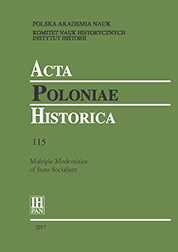On the Process of De-Stalinization of Polish Historiography – Stefan Kieniewicz (1907–92) and the Insurgent Tradition
On the Process of De-Stalinization of Polish Historiography – Stefan Kieniewicz (1907–92) and the Insurgent Tradition
Author(s): Marcin WolniewiczSubject(s): Oral history, Political history, Recent History (1900 till today), WW II and following years (1940 - 1949), Post-War period (1950 - 1989)
Published by: Instytut Historii im. Tadeusza Manteuffla Polskiej Akademii Nauk
Keywords: Stalinism;De-Stalinisation;history of historiography;Polish historiography;Polish national uprisings;tradition;„inventing traditions”;Stefan Kieniewicz
Summary/Abstract: The article is a case study illustrating the process of Stalinization and de-Stalinization of Polish historiography. The issue in question is placed in the context of tradition understood in terms of one’s relation towards historical heritage. An analysis of Stefan Kieniewicz’s historical thought, one of the most distinguished experts on the history of the national uprisings of the post-partitioned era, is hoped to provide significant insights into the process of ideologization and de-ideologization of the Polish historiography of the communist era. While in the Stalinist account of Polish history national uprisings, having been included under the category of ‘progressive traditions’, tended to be equated with Lenin’s idea of agrarian revolution, Kieniewicz’s interpretation – the evolution of which marked the successive stages of the process of de-Stalinization – tended first to replace the Leninist concept with the nineteenth-century idea of social revolution and then to abandon the ‘progressive traditions’ in favour of the ‘reactionary ones’ (the role of Catholicism and the Polish presence in the East). Thus, the Stalinist account of the uprisings understood as the anti-feudal revolutions fostering the rise of ‘capitalism’ and ‘bourgeois nation’ was giving way to an interpretation in which the nineteenth-century armed movements were seen as a national struggle for freedom resulting in the development of Polish national consciousness in the ethnically Polish territories, and in the regression of this consciousness in the eastern lands of the old Polish-Lithuanian Commonwealth. When approached from the perspective of tradition, these interpretations appear to have aimed at inventing tradition (Stalinism) on one hand and at transforming heritage in a way which preserves its historical meaning on the other.
Journal: Acta Poloniae Historica
- Issue Year: 2017
- Issue No: 115
- Page Range: 235-266
- Page Count: 32
- Language: English

